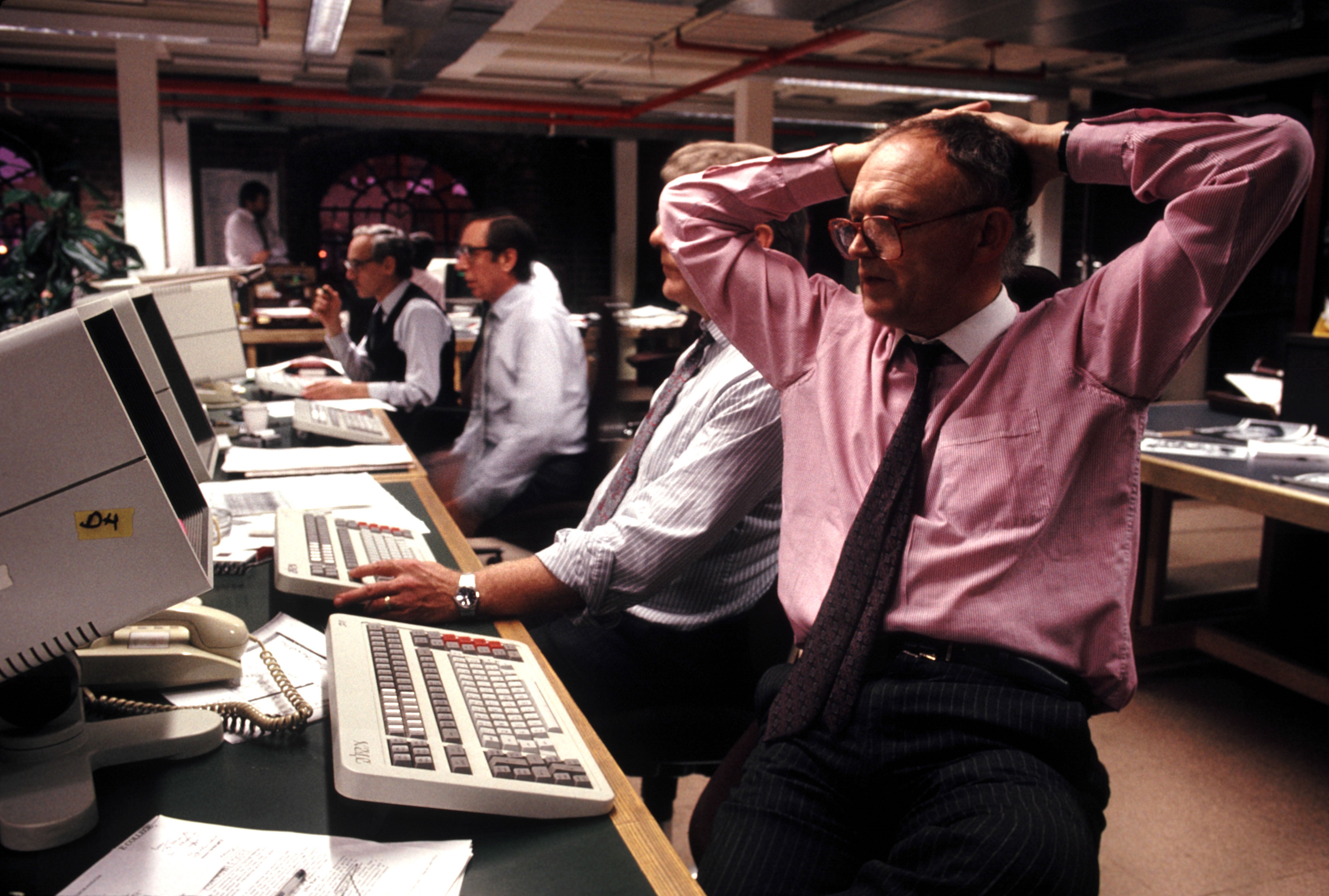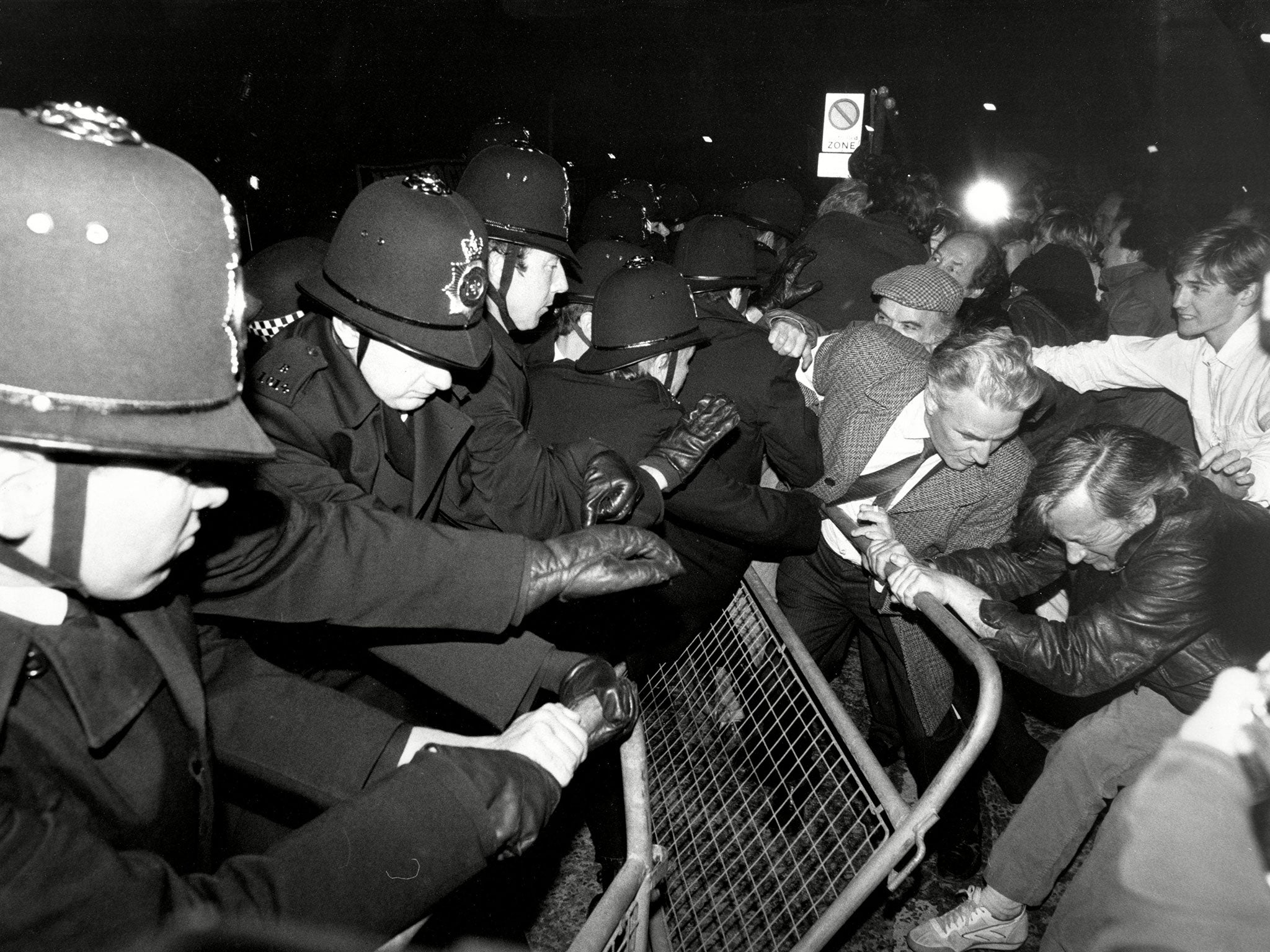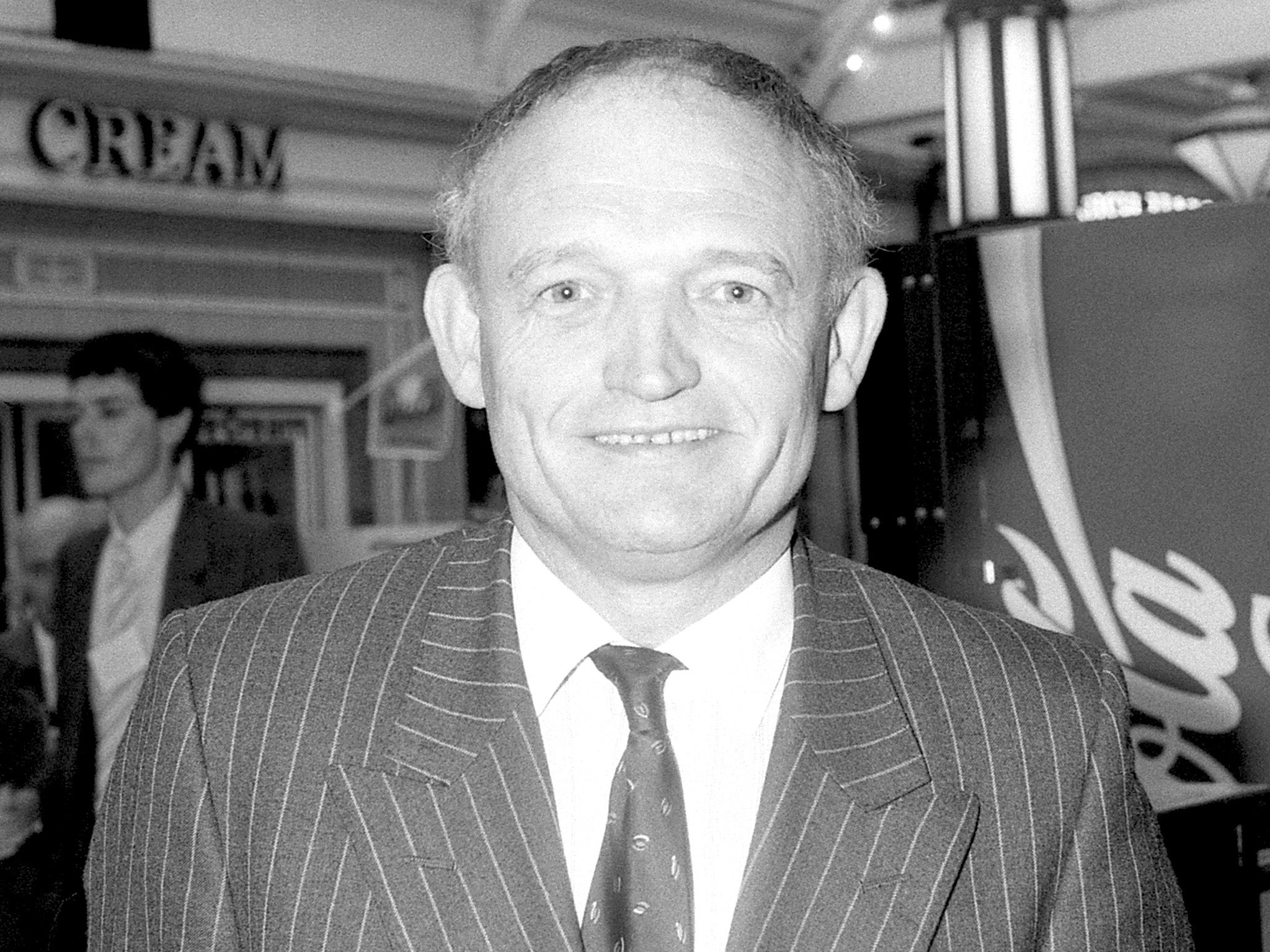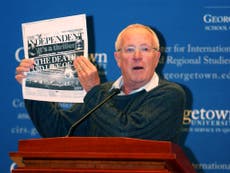Charles Wilson: Abrasive journalistic juggernaut of British newspapers
The former editor of The Times and The Independent among others, Wilson played a key role in Rupert Murdoch’s controversial switch to Wapping in 1986, a move that changed the print industry forever

Your support helps us to tell the story
From reproductive rights to climate change to Big Tech, The Independent is on the ground when the story is developing. Whether it's investigating the financials of Elon Musk's pro-Trump PAC or producing our latest documentary, 'The A Word', which shines a light on the American women fighting for reproductive rights, we know how important it is to parse out the facts from the messaging.
At such a critical moment in US history, we need reporters on the ground. Your donation allows us to keep sending journalists to speak to both sides of the story.
The Independent is trusted by Americans across the entire political spectrum. And unlike many other quality news outlets, we choose not to lock Americans out of our reporting and analysis with paywalls. We believe quality journalism should be available to everyone, paid for by those who can afford it.
Your support makes all the difference.Charles Wilson was at the centre of some of the most critical developments in the newspaper industry in the last two decades of the 20th century, although he was little known beyond the world of journalism.
He edited two national newspapers, The Times and (briefly) The Independent, in both cases spanning periods of crisis that threatened the papers’ survival. He was a trusted lieutenant of Rupert Murdoch and later of another controversial media tycoon, Robert Maxwell. It was during his editorship of The Times that Murdoch moved its headquarters overnight, along with his other London papers, to Wapping, breaking the stranglehold that the printing unions had until then exerted on the production of national newspapers.
Wilson had been a key figure in the secret preparations for that move and helped create the smokescreen that concealed them from the unions and the public. When the time came to put the plan into effect, his task was to persuade the majority of Times journalists to accept it. He did not find it easy because he had made himself unpopular with many of them, who found him a stern, disruptive and often irascible taskmaster. His roots had been in the popular press, and many of the established staff of both The Times and later of The Independent resented what they perceived as his attempts to steer the papers downmarket.
The son of a miner, Wilson was born in Glasgow and retained that city’s distinctive accent throughout his life. Educated at the Eastbank Academy, he left as he was about to enter the sixth form because his mother, after quarrelling with his father, abruptly decamped to Surrey and took Charles with her. So he had to find a job, and became a messenger at The People, the popular Sunday paper then based in Covent Garden. At 18 he did his national service in the Royal Marines, then became a reporter on the News Chronicle, staying on when the paper was merged with the Daily Mail in 1960.
He remained with the Mail for 14 years, rising to be deputy northern editor. In 1976 he moved back to Glasgow for his first editor’s chair, at the Evening Times, followed by brief tenures at the Glasgow Herald and the newly launched Sunday Standard.
It was in Glasgow that he began to get a reputation for venting his frustration with his minions in unusually demonstrative ways. He once hurled a typewriter to the floor (this was before they became technologically redundant) and became known as a head-banger because, when overwhelmed by the stupidity of colleagues, he would repeatedly bang his head against the wall, and once made a hole in a partition.
His reputation for cavalier treatment of subordinates appealed to Charles Douglas-Home, appointed by Murdoch as editor of The Times in 1982, after the dismissal of Harold Evans. Murdoch and Douglas-Home believed that the paper needed a tough, authoritarian figure to knock the journalists into shape and Murdoch, especially, was an admirer of the Daily Mail, where Wilson had spent much of his career. So he was brought to The Times, first as executive editor and then as Douglas-Home’s deputy.
Murdoch came to admire Wilson and at the beginning of 1984 took him away temporarily from Gray’s Inn Road to undertake an exceptionally tough assignment. The Australian magnate had just added the Chicago Sun-Times to his stable of newspapers, to the dismay of its journalists, who knew his reputation for ruthlessness and editorial interference. The paper’s star columnist, Mike Royko, defected to the rival Tribune as soon as the sale was confirmed.
Murdoch asked Wilson to go to Chicago for a few weeks as temporary editor, to size up its staff and see what had to be done to improve it. By now Wilson had considerable experience handling disgruntled journalists and he needed it all. Several dozen staff members of the Sun-Times accepted a redundancy offer rather than work for him. “It was a classic Murdoch-monster-myth situation,” he told William Shawcross, one of Murdoch’s biographers. “It was one of the most exciting periods of my life, a terrific challenge. People hated me. I worked out that the only way I could change them was by convincing them about my journalism.” After a few months, he had quietened most of the protestors.

Soon after he returned to London, he was handed an even trickier task. In 1982 Murdoch had bought the site of some old warehouses in Wapping, by the Thames, so as to establish a modern printing plant for his papers. By 1984 the plant was built but there had been no progress towards reaching an agreement with the print unions about how it should be manned. In 1985 Murdoch announced that he would use it to launch a London evening newspaper, the London Post. Wilson was seconded to Wapping as the prospective editor of the title, and began to set in motion procedures for hiring staff.
In the light of subsequent events, it is apparent that the London Post was simply a decoy, and that what Wilson and a few other trusted executives were doing at Wapping was preparing the ground for the dramatic flit of the four Murdoch papers from Gray’s Inn Road and Fleet Street, employing members of the ETU electricians’ union to run the presses instead of the traditional printers. In November, plans for the London Post were officially put on hold when Wilson was called back to The Times to take over as editor, following the death of Douglas-Home.
When the move to Wapping was summarily announced the following January, a handful of journalists refused to cross the picket lines outside the new plant; but Wilson managed to persuade most of his staff to join him there. For some months they had to run the gauntlet of furious printers, who hurled abuse at them as they approached the gate of the compound.
This daily harassment, and the beleaguered atmosphere at Wapping, upset many of the journalists and it happened that, a few weeks after the move, some had the chance to quit. Three writers from The Daily Telegraph announced a plan to produce a new serious broadsheet, The Independent, and began recruiting. Some of The Times’s best reporters, columnists, sub-editors and junior executives, disenchanted with Wilson’s abrasive manner and the direction in which he was leading the paper, left Wapping and played a significant role in The Independent’s initial success in attracting readers, some of whom switched from The Times.
But Wilson had admirers as well as enemies. In 1988 he hired Matthew Parris to write the parliamentary sketch, starting the former Conservative MP on a new and highly successful career path. Parris admits to owing him a tremendous debt. “Charlie, foremost among others, instilled in me the understanding that journalism is a trade, not an art or a work of genius,” he wrote in 2004.

By 1990 Murdoch felt that The Times, if it was to regain readers lost to The Independent, needed to move upmarket again; so he removed Wilson and replaced him with Simon Jenkins, the cerebral author and columnist. Wilson was given the title of international developments director at News International, Murdoch’s British holding company, with specific responsibility for projects in eastern Europe. It was something of a non-job, though, and he soon accepted a surprising offer from Robert Maxwell, proprietor of the Mirror Group of newspapers since 1984.
Maxwell had learnt that horses were among Wilson’s abiding passions: he enjoyed riding them and was also a devotee of horse racing. On The Times, he had organised a syndicate of like-minded journalists to buy and race a couple of horses, with little success, and in 1993 he would be admitted to the Jockey Club. He was therefore intrigued when Maxwell invited him to become managing director and editor-in-chief of The Sporting Life, then Britain’s premier racing paper.
That was his entrée into Maxwell’s circle of close advisers, and he soon established himself in other roles. When the tycoon went to New York in 1991 to buy the Daily News, he took Wilson with him. A few months later Maxwell decided to launch an American racing paper, the Racing Times, to compete with the established Daily Racing Form, owned by Murdoch. Wilson was deputed to edit it, but the new paper lasted only a few months.
In November 1991 Maxwell drowned when he slipped – or jumped – from his yacht off the Canary Islands. Because of his press experience, Wilson was asked to act as the family spokesperson during the ensuing crisis caused by a series of damaging revelations about Maxwell’s financial dealings. The following year David Montgomery emerged as chief executive of the reconstituted Mirror Group and, although he quickly fired several senior executives, Wilson stayed on as managing director.
In 1994 the group acquired a half-share in The Independent which, after its initial success, had run into trouble due to indecisive management during the economic recession. Montgomery asked Wilson to edit the paper temporarily and introduce a measure of stability before passing the baton to an editor of his own choice. The reaction of the staff was similar to that which he had met at The Times – suspicion of his populist instincts and resentment of his combative manner with subordinates.
The successor he eventually chose, the multitalented Andrew Marr, proved, by his own later admission, unsuited to the disciplines of editing a national daily. Wilson was the man he reported to, and the two men could never see eye to eye on the paper’s editorial direction or its budget. Under the circumstances, it was scarcely surprising that The Independent’s fortunes continued to decline until the Mirror Group surrendered its interest in 1998.
That was also the year in which Wilson stood down from the group. From then on, he devoted much of his time to serving on a variety of public bodies, including the Competition Commission, the Countryside Alliance, Youth Justice, the World Wildlife Fund, the Royal Naval Museum and the Chelsea and Westminster NHS Trust.
He married three times and had three children. His first wife was the columnist Anne Robinson, who later became a well-known television presenter. His second and longest marriage was to the magazine editor Sally O’Sullivan and his third, in 2001, to Rachel Pitkeathly.
Wilson is survived by his wife, his three children, Emma, Luke and Lily, and seven grandchildren.
Charles Martin Wilson, journalist and editor, born Glasgow 18 August 1935, died 31 August 2022


Join our commenting forum
Join thought-provoking conversations, follow other Independent readers and see their replies
Comments